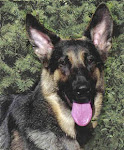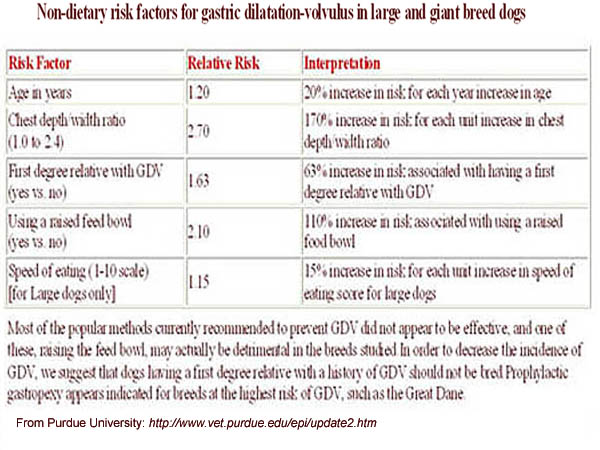After I heard about a nasty disease that could kill me, I decided to listen very carefully to everything my people said about it. The disease is "Bloat" or Gastric-Dilatation-Volvulus syndrome (GDV). It can be a serious killer of large and giant breed dogs. After I heard my partner say that there were some new findings on prevention of GDV coming out of Purdue University's veterinary school, I made sure I found out what they were all about. Some of the findings were opposite to what I had originally learned. Here is the summary:
"Dietary Risk Factors for Gastric Dilatation-Volvulus (Bloat) in 11 Large and Giant Dog Breeds" http://www.vet.purdue.edu/epi/dietrisk.htm
(1) Having a raised food bowl increases the risk of bloat (GDV). This is opposite to what most people have thought in the past.
(2) If the dry food has fat listed in the first 4 ingredients, the risk of bloat is increased. In fact, one-third of all cases of bloat in this study could be attributed to feeding dry foods containing fat among their first 4 ingredients.
(3) The risk of bloat is increased dramatically if the dry food fed contained citric acid and was also moistened prior to feeding. Almost one-third of all cases in this study could be attributed to this.
(4) Dry foods containing a rendered meat meal with bone among the first four ingredients significantly decreased GDV risk.
Wow....This is pretty dramatic. My partner has told me that she has seen a lot of bloat cases in her life. If caught early, surgery can be very successful, but the studies on prevention have not been terribly helpful in the past.
Here is a list of articles about GDV: http://www.ncbi.nlm.nih.gov/sites/entrez?Db=pubmed&DbFrom=pubmed&Cmd=Link&LinkName=pubmed_pubmed&LinkReadableName=Related%20Articles&IdsFromResult=15683769&ordinalpos=1&itool=EntrezSystem2.PEntrez.Pubmed.Pubmed_ResultsPanel.Pubmed_DiscoveryPanel.Pubmed_Discovery_RA
Friday, March 14, 2008
Subscribe to:
Post Comments (Atom)






11 comments:
If you are concerned about bloat, you may want to check out our EatBetter and DrinkBetter products. They were designed specificially for this reason.
http://www.contech-inc.com/products/eatbetter/
Tracey Robertson
Yes, anything that decreases the air swallowed during food consumption also reduces the danger of bloat. That is why it is better to place the bowl on the floor than to keep it elevated, because dogs swallow more air when it is elevated. Slowing the speed at which they eat is also important, and the products that Tracey mentioned appear to be geared toward that end. I have also heard that placing a large rock (too big to swallow!) in the food bowl causes a dog to eat more slowly, because he has to push the rock out of the way to finish eating. I will find the reference on air-swallowing for you.
Here is a summary of bloat risk factors identified in the Purdue bloat study: http://www.vet.purdue.edu/epi/update2.htm I have posted these on the main portion of the blog.
This is the main list of research updates:
http://www.vet.purdue.edu/epi/bloat.htm
The NON-dietary risk factors are posted at the bottom of the blog. These are things like air swallowed, heredity, etc. The dietary factors are the ones described in this post.
The effect of ingredients in dry dog foods on the risk of gastric dilatation-volvulus in dogs.Raghavan M, Glickman NW, Glickman LT.
Department of Veterinary Pathobiology, School of Veterinary Medicine, Purdue University, West Lafayette, Indiana 47907-2027, USA.
Using dry dog food label information, the hypothesis was tested that the risk of gastric dilatation-volvulus (GDV) increases with an increasing number of soy and cereal ingredients and a decreasing number of animal-protein ingredients among the first four ingredients. A nested case-control study was conducted with 85 GDV cases and 194 controls consuming a single brand and variety of dry food. Neither an increasing number of animal-protein ingredients (P=0.79) nor an increasing number of soy and cereal ingredients (P=0.83) among the first four ingredients significantly influenced GDV risk. An unexpected finding was that dry foods containing an oil or fat ingredient (e.g., sunflower oil, animal fat) among the first four ingredients were associated with a significant (P=0.01), 2.4-fold increased risk of GDV. These findings suggest that the feeding of dry dog foods that list oils or fats among the first four label ingredients predispose a high-risk dog to GDV.
(J Am Anim Hosp Assoc. 2006 Jan-Feb;42(1):28-36; abstract found on: http://www.ncbi.nlm.nih.gov/pubmed/16397192?ordinalpos=13&itool=EntrezSystem2.PEntrez.Pubmed.Pubmed_ResultsPanel.Pubmed_RVDocSum)
Small size of food particles and age as risk factors for gastric dilatation volvulus in great danes.Theyse LF, van de Brom WE, van Sluijs FJ.
Faculty of Veterinary Medicine, Department of Clinical Sciences of Companion Animals, Utrecht, The Netherlands.
A case-control study was conducted to investigate whether age, gender, neuter status, type of food, feeding frequency, food intake time, interval between feeding and exercise, duration of exercise and overall physical activity were risk factors for gastric dilatation volvulus (GDV) in the great dane. The sample population consisted of 38 great danes with acute GDV (cases) and 71 great danes owned by members of the Dutch Great Dane Association (controls). Information on the risk factors was collected by using clinical data in combination with a questionnaire, and the data were analysed by backward stepwise conditional logistic regression analysis. Dogs fed a diet containing particles of food > 30 mm in size (kibble and/or dinner and/or home-prepared food with large pieces of meat) had a lower risk of GDV than dogs fed a diet containing only particles < 30 mm in size (kibble or dinner and/or canned meat and/or home-prepared food cut into small pieces or ground in a food processor). Increasing age was also a risk factor for GDV. Gender, neuter status, feeding frequency, food intake time, the interval between feeding and exercise, the duration of exercise, and overall physical activity were not identified as risk factors. Feeding a diet including large pieces of meat may help to reduce the incidence of GDV in great danes.
(Vet Rec. 1998 Jul 11;143(2):48-50; abstract found on: http://www.ncbi.nlm.nih.gov/pubmed/9699253?ordinalpos=1&itool=EntrezSystem2.PEntrez.Pubmed.Pubmed_ResultsPanel.Pubmed_DiscoveryPanel.Pubmed_Discovery_RA)
Hi Ginny, great post and great comments too!
I had a brush with bloat back in June. Well ,luckily just early symptoms, I did not need surgery. But now my human makes me follow a bunch of rules. (Since I don't eat kibble my rules may differ a bit).
I can not eat anything for three hours prior to exercise and I can not eat anything for a few hours after exercise (I have to be completely relaxed and breathing normally, no panting).
When I get water during and after exercise it needs to be tepid and in small amounts. No gallon size bowls of ice water anymore :(
I am not allowed to over do it, especially on hot days anymore. I'm allowed to exercise, but for example, if I'm only used to running for 45 minutes at a time, I'm not allowed to run for an hour and half. This is good advice in general. I've strained muscles before and that's no fun either.
I eat two small meals per day rather than one large one. We actually have two reasons for this, I tend to puke if I eat too much at once.
If the human even suspects that I have gas or an uncomfortable belly she immediately gives me gas-x and starts watching me like a hawk. She also keeps baby gas-x (because it's fast acting) and the homeopathic remedy carbo vegetabilis on hand (because it may help and it's harmless).
The boss says that if I ever start to bloat again we're going to the vet right away, no ifs ands or butts about it.
Woof!
-Indy
Thanks for your comments, Indy. I gather, from all the research that has been done, that exercise patterns were not as important as once thought. However, it never hurts to be cautious. Here is a long list of articles (with their abstracts) on bloat-related subjects: http://www.ncbi.nlm.nih.gov/sites/entrez?Db=pubmed&DbFrom=pubmed&Cmd=Link&LinkName=pubmed_pubmed&LinkReadableName=Related%20Articles&IdsFromResult=8050972&ordinalpos=1&itool=EntrezSystem2.PEntrez.Pubmed.Pubmed_ResultsPanel.Pubmed_DiscoveryPanel.Pubmed_Discovery_RA&log$=relatedarticles&logdbfrom=pubmed
Well, I think you said it best when you said that anything that decreases air swallowed during consumption of food reduces the danger of bloat. I think that exercise and excitement, anything that induces panting when there is food in the stomach, may contribute. The one incident that Indy had was following a period of strenuous exercise (more than usual in warmer than usual weather), about 45 minutes later I gave him a snack, though 45 minutes had passed, he was not completely settled. However, he also got too much exercise and was allowed to have a large bowl of very cold water when we first got home while he was still panting hard. This may have also been a contributing factor. It's hard to pin it down, I did several things wrong that day. But I do feel more comfortable leaving a large gap between food and exercise.
Thank you for the link, LOTS of reading material there! :)
My vet owner, who has seen many cases of bloat during her years as an emergency vet, says that a lot of the dogs she has treated drank a lot of water before the bloat signs began. Another common association is dogs who are boarding. Boarding dogs are under stress, which tends to slow down the GI tract. They often pant a lot from excitement or anxiety, swallowing air in the process. Dogs also lose quite a bit of moisture when they pant, becoming thirsty, often guzzling water. Swallowed air, extra water in the stomach, and slowed gastric (stomach) emptying, create a nasty combination that, along with a fermentable food substance, start creating new gas similar to the way yeast raises bread dough.
-Woof,
Ginny
I am very glad you enjoyed it. I'll have to go visit your site, too.
-Woof.
Post a Comment